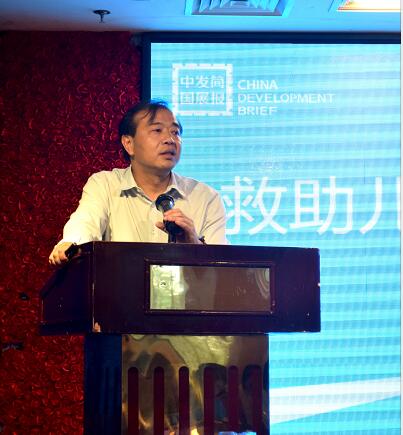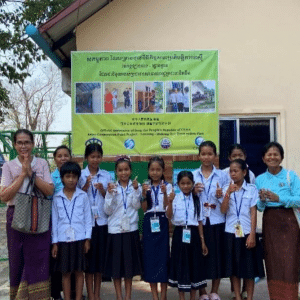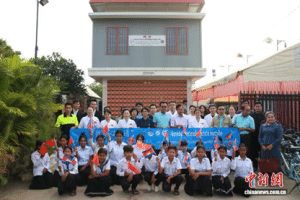The speech below was delivered by Wang Chao, Save the Children International’s Head Representative for China, during CDB’s workshop on the registration of Overseas NGOs in China, on the 28th of July. The speech is a measured reflection on the current situation of international NGOs in China, looking beyond the current issue of registration. Wang Chao suggests that international NGOs should turn their focus more on self-examination, arguing that only when they reassess what they can bring to the table will they find a way out for the future. What follows is our translation of the original record of Dr. Wang Chao’s speech. Some parts have been edited or cut out for brevity and clarity.

From my point of view, the issuing and implementation of the Law on the Administration of Activities of Overseas Non-Governmental Organisations is of watershed significance. For those of you who are in the process of registering, those not registered, and particularly for those of us already registered, this will have an extremely great impact on our views, and especially on the whole system of discourse. I don’t know about those of you in the audience who work in my same sector, but at least in our organization, we all talked on many occasions before 2017 about how after registration we would be able to do this and that, what sort of things we could do, and what we could do if we could raise money. But as soon as the time arrived, the whole discourse system began to change, and it became “now you have already registered, then in that case you should do this or that”, therefore I think this is an extremely important watershed moment.
From January onwards, Save the Children began to promote a strategic plan. Throughout the past few months, we have hoped to carry out our reflections based upon strategic foundations. In our development we often need to undergo paradigm shifts, including our whole system of discourse, which also ought to change. Of course I want to share these reflections with everyone, but bare in mind that these are only based upon the challenges after registration faced by Save the Children or a similar kind of institution.
“With regards to Overseas NGOs, the development of China’s situation and of Chinese civil society is like a high-speed train rushing towards the future. Whether or not our organizations are on board, the high-speed train will continue to head to the future.
I would like to use an analogy: I’m sure you have all been on a high-speed train, these trains are a feature of China that really attracts attention nowadays, and they are very quick. With regards to Overseas NGOs, the development of China’s situation and of Chinese civil society is like a high-speed train rushing towards the future. Whether or not our organizations are on board, the high-speed train will continue to head to the future, and registration is a bit like buying a ticket to see if it is possible to catch this high-speed train travelling forward. More importantly for us, I think this is a very significant learning curve. From 2008, the entire Chinese public welfare and charity sector began to embark on a high-speed learning curve and a process that is continuously repeating itself and evolving. But this kind of process is not part of all overseas NGOs’ past experience, or part of the past experience in other countries.
I therefore think this is an extremely important process, and possibly after registration it will be even more necessary to engage in strategic reflections on how there can be integration during the process of these high-speed changes, how we can jointly share in and shape this process, and how we can grow and advance together over the course of the whole process. I think this is what we originally did not consider as much in all of our reflections.
“In reality a major change has already come across the whole sector. China has begun to shift from being a receiver of aid to being a provider
Secondly I think that when we talk about this paradigm shift, in reality we need to start from the context. For so many years, especially from the time when some international NGOs first arrived in China, more than half of them came from a foreign aid context; an international organization would bring some resources and some new concepts to help China, especially on issues such as the environment, poverty alleviation and education. This context has already existed for around 30 years, and the organizations have actually internalized this context in their way of looking at problems. But in reality, the whole of present-day China is already undergoing a fundamental change. Of course, there is still a lot of work to do in poverty alleviation and social development, and many might give help, but the truth is that a major change has already come across the whole sector. China has begun to shift from being a receiver of aid to being a provider.
The systems for providing aid to overseas countries include the “South-South Cooperation”, the “One Belt One Road”, and “China’s NGOs Going Out”. In reality this Chinese development process is not taking place in the context that international NGOs move in; at least this is the case for Save the Children. We very rarely discuss these kinds of issues, and if we do it is more from the position of an observer. It seems to be very difficult to enter this field, so I think this kind of situation represents a big challenge. With regards to China’s local NGOs on the other hand, the situation isn’t the same; their whole identity is undergoing rapid changes, they developed in the middle of this situation and they are more based in the local context, so perhaps they are more suited to the circumstances. So I think this kind of scenario and ecosystem is one that requires us to look at it from an even broader perspective, and consider whether or not we can integrate and whether or not we can get involved through more effective forms of partnership.
“Now it is different, even if you are still holding the hammer, you might not be able to find that many nails. With regard to overseas NGOs, I believe that in China they urgently need to become organisations based around learning, and they urgently need to undergo a transformation.
Another point also related to rhetoric and worldview is that international NGOs like to pay attention to problems, but China’s current changes are mostly driven by a vision of the future, rather than genuinely solving these problems.
There was a philosopher who once said, if the only tool you have is a hammer, then all of your problems will look like nails. This resembles the situation of many organisations. In particular, there are some historic international organisations which all have a full set of established processes for solving problems in development, disaster relief or similar areas, and they have already become an extremely successful force in the global sphere. It seems as if they have extremely effective and powerful ‘hammers’. Previously, particularly from the beginning of the ‘Reform and Opening Up’ era up until 2008, having this kind of hammer was relatively effective. At that time we could find many nails, we made many contributions and the resources we brought were even impressive. But now it is different, even if you are still holding the hammer, you might not be able to find that many nails. With regard to overseas NGOs, I believe that in China they urgently need to become organisations based around learning, and they urgently need to undergo a transformation. Because of this environment of high-speed changes, our original plans for solving problems may not be effective.
Now it is more about whether or not you can bring increased value, and whether or not you can bring more creative ideas and innovative concepts to this rapidly changing society. And with regards to international NGOs we have more of a burden, because we believe that this hammer of ours is very effective, it is very useful, and would you really have us throw it aside? It seems very hard, but if we do not abandon it then perhaps there are not too many places where we can contribute. Of course this is just our reflection, we are just bringing it up for everyone to discuss.
Becoming a learning organisation, one that can keep up with this environment of constant rapid changes, is therefore extremely urgent. For us, if we cannot learn quickly or integrate with these kinds of changes, then perhaps we will not add much value. Truly, the ones doing this better are the local organisations, they have more creativity and they pay more attention to how to learn through their actions or advance their research.
“We should change the focus of our lens and carry out some introspection. We should take a genuine look at what sort of value our organisations can add in the end
When carrying out an analysis of the situation, I also had a sense that it sounded like China has an abundance of this kind or that kind of opportunity or challenge. From my point of view most of the challenges really come from the internal departments of organisations, especially within some international organisations. In the past we have mostly been focusing our lens on our surroundings, to see if we can solve any of the problems there, but now we should change the focus of our lens and carry out some introspection. We should take a genuine look at what sort of value our organisations can add in the end.
Re-focusing our lens to look at ourselves is I believe an extremely important process within the scope of strategic reflection, and it is also something all of our practitioners need to do. When your funds and resources are no longer an advantage, what are your other resources? Do you have more advanced technology, or newer concepts, or more creative capabilities, or do you have something else, or is there an even more important catalyst? I believe we need to re-examine the relative advantages of our own organisations.
The last point is about our strategic plan, and of course this is a question of strategic reflection. For example, we must think about what short-term contributions our institutions can make, and what the long-term ones might be. There are also technical questions, for example registration, which all along has been a technical question, and is very crucial and very important, but it is still only a technical question. More important is how to make the organisations have a suitable vision and mission for China’s local circumstances. In developed countries such as in Europe or the US, the aura of superiority and the halo surrounding organisations like international NGOs has already lost its significance, and in China it is the same, in China the society is increasingly rapidly internationalised, and therefore international organisations increasingly need to have international angles and perspectives. We must achieve a localised form of development, and this is perhaps the future for international NGOs in China.



